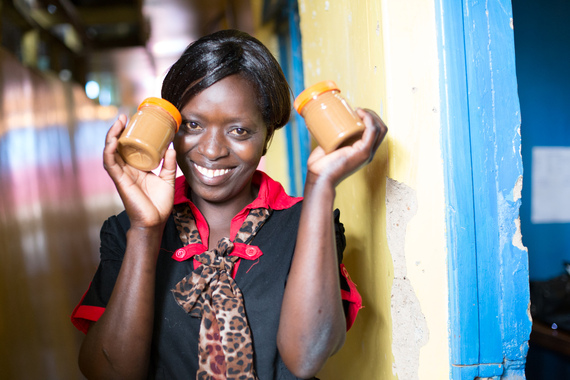I've always loved this Amartya Sen quote: "Empowering women with more choices and more freedoms is crucial to achieving a better future for all." If there is a catalyst to development and increased overall well-being, I believe that it lies in the empowerment of women and girls. In addition to fortifying women with more choices and freedoms in areas like education, healthcare and nutrition, I think that one of the most powerful ways to expedite "a better future for all" is to give women greater economic freedom and opportunities.
I am not alone in this belief. The Heritage Foundation, a think tank in Washington, D.C., has found positive correlations between economic freedom and women's empowerment. Ambassador Terry Miller of The Heritage Foundation once wrote: "Strong relationships between economic freedom, economic growth and gender equality show clearly that we need to embrace an ideology of economic liberation for women." This correlation exists primarily because economic freedom and opportunity pave the way for business and job creation; women are resultantly poised to reap the benefits of employment and economic participation.
However, women everywhere still encounter injustices and strictures that impede their economic empowerment. And in the developing world, women's economic freedom is the exception and not the norm. For women in developing countries, opportunities for economic empowerment like starting a business or obtaining a job beyond the home are few and far between. Many have limited access to seed funds and microcredit, compounding difficulties in ending intergenerational poverty. Women's voices and opinions are often missing from community-wide discussions on development and finance, and weak institutions and toothless laws often leave women lacking empowerment economically.
But, the idealist that I am, I believe that grassroots organizations working toward furthering women's economic opportunities in the developing world will change this upsetting reality for women. My interview with Lexi Hensley, Director of Community and Outreach at Shining Hope for Communities (SHOFCO) reinforced my beliefs. SHOFCO is a nonprofit with a mission of combating intergenerational poverty and gender inequality in the urban slums of Nairobi, Kenya.
SHOFCO boasts an organizational model that is holistic, integrated and focused on a tuition-free school for girls. Within this school, SHOFCO targets a variety of components crucial to the empowerment process, providing a combination of education, free healthcare, nutritional, community services and psychosocial services to impoverished yet high-potential female students.
What stood out for me most among this wealth of investments was SHOFCO's great emphasis on encouraging women's entrepreneurial activities, attested by two of its projects: Innovator's Platform and SHOFCO Women's Empowerment Project (SWEP). When I asked Lexi Hensley why SHOFCO decided to develop these programs, she remarked that the "unfortunate and profound stigma against HIV-infected women in Kibera" provided the impetus for their founding. "SWEP provides an opportunity for HIV-positive women to empower themselves despite this marginalization. The Innovator's Platform provides a holistic approach for members to learn new crafts and earn an income."
SHOFCO's Innovator's Platform targets prospective women and youth entrepreneurs, equipping them with resources and opportunities needed to launch their small businesses, while SWEP empowers HIV-positive women through business and entrepreneurial education, providing them with a living wage through the production and sale of handcrafted products. When participants satisfy training requirements for the Innovator's Platform, or graduate from SWEP, they are eligible for loans and seed capital to start their businesses.
These women's entrepreneurial ventures thrive partly because of SHOFCO's Group Savings and Loans Project (GS&L), a third project focused on economic empowerment, financial independence and inclusion. "Conceived as an alternative to the formal financial sector, GS&L groups are community-based, user-owned and self-managed savings and lending vehicles built on concepts of transparency and flexibility," Lexi asserts. Its standardized, structured methodology encourages members to save regularly and "grow lump sums for diverse purposes such as loans, emergency lending and general savings."
According to Lexi, SHOFCO's economic empowerment programs have created positive and progressive change throughout Kibera. Although only "44 percent of married women in Kibera participate in household financial decisions, 62 percent of women whose daughter attends the Kibera School for Girls either jointly control or spearhead household financial decisions." These community empowerment programs have also boosted employment rates among enrolled women. "Women enrolled in our programs showed an 8 percent increase in employment over a one-year period from 52 percent to 60 percent," substantially higher than the 51 percent employment rate for women in Kibera.
In my The NextWomen article "The Case for Women Entrepreneurs", I write that women's entrepreneurship in lesser-economically developed countries will help women escape poverty traps. Lexi's words on small businesses and entrepreneurship in Kibera's context allow me to add to this point: Women's entrepreneurship also empowers others to be active agents and "the foundation of social and economic change in their society." Women's economic empowerment through entrepreneurship "brings deeper knowledge and technical skills to the community, providing individuals with the tools they need to create bright futures," Lexi says.
Sometimes, people ask me why I spotlight the efforts of social enterprises and businesses that empower women. Always, I tell them that it's because these stories authenticate the power and potential that lies within every woman and girl, showing that the emergence of a gender-equal world offers the ultimate win-win situation. Learning more about SHOFCO and its efforts to further economic opportunity for women has strengthened my conviction in this truth. I write, for I hope to highlight stories of forward-thinking and strategy, which teach us to focus not on entrenched problems, but on the solutions needed to end them and propel further impact. I write, because change-makers like the SHOFCO team are doing so much to better the lives of women and safeguard "a better future for all," and they deserve the most enthusiastic of acclaims.
Additional contributing from Kaylie Cordingley, Community Officer and Bea Lumanas, Grants & Data Manager at Shining Hope for Communities.
Originally posted on The NextWomen Business Magazine.
